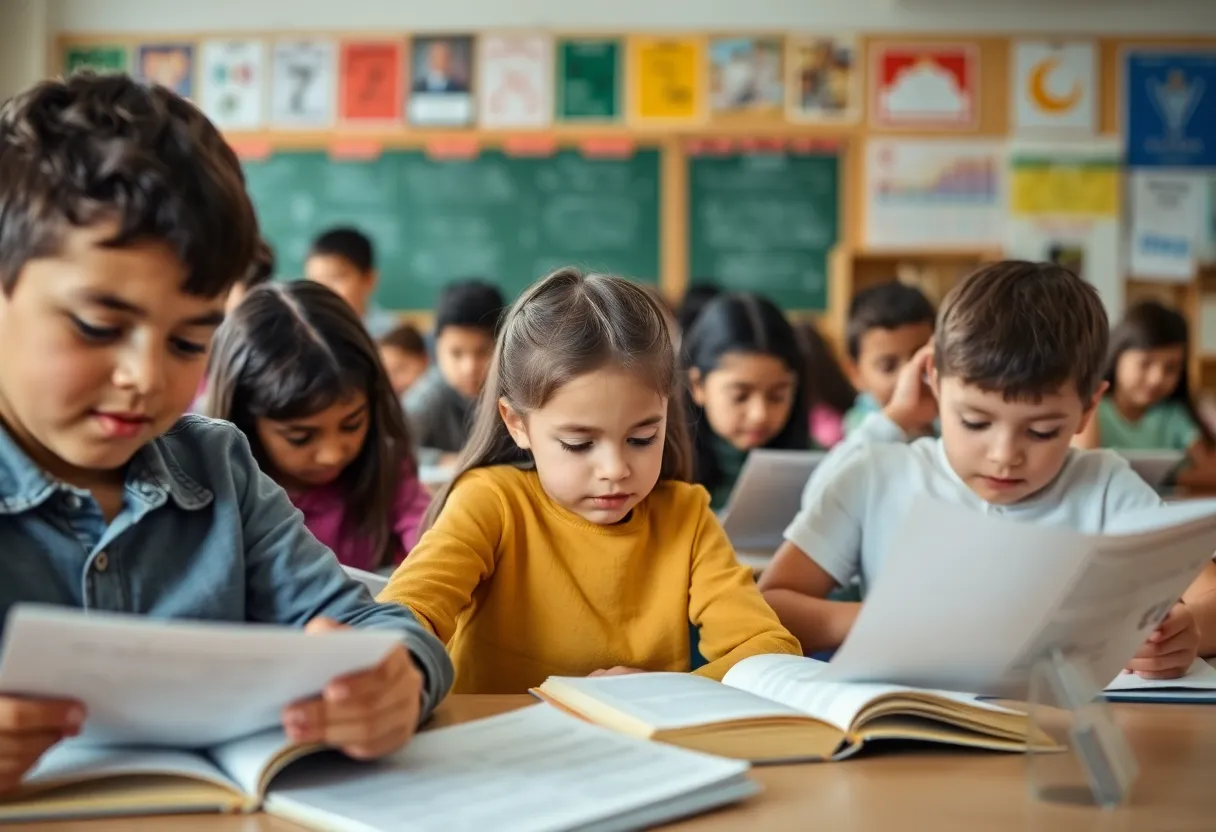News Summary
Recent NAEP data reveals a significant decline in student performance in reading and mathematics, marking the lowest achievement levels in over 20 years. Particularly concerning is the high percentage of high school seniors scoring below basic proficiency. The findings point to persistent achievement gaps, especially among different demographic groups and a notable re-emergence of gender disparities. Educators and policymakers are urged to implement reforms and increase investments in education to address these alarming trends and improve student outcomes.
Washington, D.C. – Decline in Student Performance Continues as NAEP Reports Historic Lows
Student achievement in reading and mathematics across the United States has reached its lowest point in over two decades, according to recent data released from the National Assessment of Education Progress (NAEP), commonly known as the nation’s report card. The assessments conducted from January to March 2024 reveal a persistent downward trend in academic performance among high school seniors and eighth graders, marking a significant concern for educators nationwide.
Key Findings on High School Performance
The latest data indicates that 12th-grade students continue to struggle with foundational skills in reading and math. Scores in these subjects have fallen to their lowest levels since NAEP testing began over 20 years ago. Specifically, approximately 32% of high school seniors scored below the basic proficiency level in reading, and 45% scored below the basic level in math. These figures highlight a growing share of students failing to meet minimum academic standards.
In addition, only about 33% of graduating seniors are considered prepared for college-level math, a decline from 37% recorded in 2019. The average score in reading for 2024 was the lowest since 1992, when the NAEP assessments first began measuring student progress. Such statistics point to an enduring pattern of academic challenges that predate the pandemic, although the disruptions caused by COVID-19 have exacerbated existing issues.
Performance of Middle School Students and Science Scores
For eighth-grade students, there have been notable declines in science skills. The assessment results show fewer students reaching proficient levels, with significant gaps in performance emerging when compared to previous years. Earlier assessments noted widening disparities across different demographic groups, and recent data suggests these gaps continue to grow.
Among eighth graders, there has also been a decline in engagement with inquiry-based learning activities, which are essential for grasping scientific concepts. This reduction in hands-on learning experiences during the pandemic has been linked to the decrease in performance and lowered interest in science subjects.
Emerging Gaps and Gender Disparities
The data Highlights significant achievement gaps in both reading and math, particularly among different socioeconomic and demographic groups. The disparities in results are most pronounced in eighth-grade science and twelfth-grade math, with certain groups lagging behind others.
A re-emergence of gender gaps has been observed in recent assessments. Girls experienced a steeper decline in scores in science and math since 2019, reversing some previously narrowing gaps and raising concerns about gender-specific factors influencing academic performance.
Contributing Factors and Educational Trends
Experts suggest that the ongoing decline in performance results from multiple factors beyond the pandemic. These include increased screen time among students, shortened attention spans, and changes in teaching methodologies that have resulted in less extensive reading assignments. For example, high school English classes now often assign only three books a year, compared to about 20 two decades ago, impacting literacy development.
Teachers and schools have also faced challenges in providing hands-on learning experiences. During the pandemic, many schools struggled to implement effective in-person and experiential learning, which appeared to have long-term consequences on student understanding and engagement in scientific and other subjects.
Policy and Future Implications
Education officials and policymakers recognize the need for more localized control over education funding to address achievement gaps and improve student outcomes. Education Secretary Linda McMahon emphasized that greater flexibility in spending could help target resources more effectively. Conversely, some legislative voices argue that dismantling the Education Department could hinder efforts to promote educational equity, which many believe is crucial to reversing current trends.
Summary of Key Data
- Only 33% of high school seniors are college-ready in math, down from 37% in 2019.
- 45% of high school seniors scored below the basic proficiency in math—the highest percentage since 2005.
- 32% of high school seniors scored below basic in reading—the lowest since NAEP began.
- The average reading score in 2024 was the lowest recorded.
- Disparities remain wide, especially in eighth-grade science and twelfth-grade math.
- Gender disparities are re-emerging, with girls’ scores declining more steeply since 2019.
Conclusion
The NAEP results signal a critical need for targeted educational reforms and increased investments to bolster literacy, numeracy, and scientific understanding among students. With scores continuing to decline, educators, policymakers, and communities face ongoing challenges to ensure that students meet the academic standards necessary for college readiness and future success.
Deeper Dive: News & Info About This Topic
HERE Resources
Evanston School Board Discusses Financial Challenges and Closures
Encinitas Surfers Excel in Recent Competitions
Safety Concerns Lead to Cancellation of High School Football Game
Labor Day Weekend Offers Boost for Virginia Beach Businesses Amid Summer Slump
Texas A&M University Approves Major Campus Developments
High School Football Game Canceled in Revere
Heavy Rain Disrupts High School Football in Charleston
Philadelphia School Board Addresses SEPTA Cuts and Charter Closures
Knox County Schools Rank Among Top High Schools in Tennessee
Chicago High Schools Shine in U.S. News Rankings
Additional Resources
- KION546: Best Public Middle Schools in California
- Wikipedia: Education in the United States
- California Local: How California Measures School and Student Success
- Google Search: Educational success in California
- Newsweek: San Francisco Public Schools’ Equity Homework
- Encyclopedia Britannica: Education
- Fox News: San Francisco School District Ditches Grading Equity Program
- Google Scholar: Grading equity programs
- Mountain Enterprise: STAR Testing Results for El Tejon Unified School District
- Google News: Decline in education performance
- National Review: San Francisco High Schools’ Equity Grading Program
- CBS News: San Francisco Grading for Equity Backlash
Author: STAFF HERE VIRGINIA BEACH WRITER
The VIRGINIA BEACH STAFF WRITER represents the seasoned team at HEREVirginiaBeach.com, your trusted source for actionable local news and information in Virginia Beach, Virginia Beach City, and beyond, delivering "news you can use" with comprehensive coverage of product reviews for personal and business needs, local business directories, politics, real estate trends, neighborhood insights, and state news impacting the region—supported by years of expert reporting and strong community input, including local press releases and business updates, while offering top reporting on high-profile events like the Virginia Beach Neptune Festival, East Coast Surfing Championship, and military homecoming celebrations, alongside key organizations such as the Virginia Aquarium, Virginia Beach Convention Center, and Oceana Naval Air Station, plus leading businesses in tourism and defense like Busch Gardens and Northrop Grumman, and as part of the broader HERE network including HEREWilliamsburg.com, providing credible, in-depth insights into Virginia's vibrant landscape. HERE Virginia Beach HERE Williamsburg





